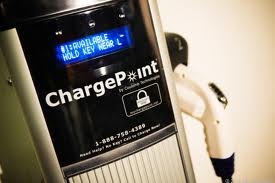Electric Powered Cars FAQ
How far can you drive electric powered cars before having to recharge the battery?
Depends on your car and type of batteries. About 50 miles is the typical range. Manufacturers are rapidly improving in battery performance and efficiency though. For instance Tesla claims their Roadstar will run 200 miles (350 km) on electric power alone.
Some employers are now providing recharging facilities at work for their employees. So while you work away at the office, your electric car could be recharging all day in preparation for the journey home. This would double the range for many commuters. Employers, please note! There may even be tax incentives for you. Enquire locally!

Can I get an electric shock from an electric car?
No. Unless there is something terribly unusual and wrong. (If you do a DIY conversion and don't wire it up properly, then in theory, it could happen.) Electric car batteries do not use the car chassis for grounding and so are very safe. There are also other circuit-breaker systems built in to electric cars as safet features. Obviously, you need to take sensible precautions when doing work under the bonnet of your electric powered car. Always follow the proper safety procedures and if you don't know what you're doing, don't do it! As with any car battery, be careful not to touch the live parts. Be savvy and be smart when working with your car. In terms of driving and being in your car, you are at no danger of an electric shock, not even when it rains!

What about electromagnetic fields?
Recharging the battery, creates an electromagnetic field, up to three feet around the charger. So don't stand there watching over it and put it in a place away from where people might be. Other than that, studies so far have not shown any danger from electromagnetic fields within electric cars while driving However, it is possible to get your car fitted with a shielding system if you are worried about this.

What kind of maintenance is there on an electric powered car?
What about balance? Does the weight of all those batteries destabilise my electric powered car?
With manufactured electric cars, they are designed with heavy batteries in mind, so there are no issues.

What about fumes when recharging?
Yes, hydrogen fumes can be produced. This can happen if you are overworking your batteries when their charge is very low. It can also happen if you overcharge your battery.
To prevent dangerous build-up of fumes, make sure the battery encasement is vented and if you are recharging in a garage, your garage should be well ventilated.
Hydrogen dissipates almost instantly into the atmosphere, so it should not be a problem when in the open, or in a properly vented space. If there is a build-up of hydrogen, you will be aware of a strong, acidic smell. This is a warning that there is not sufficient ventilation. The hydrogen could, in theory, explode if there is a large concentration of it. This is very unlikely to occur. But if you smell anything like this, you should leave the area and make sure you leave the door open after you to dissipate any fumes. Then get your car seen to by an expert.